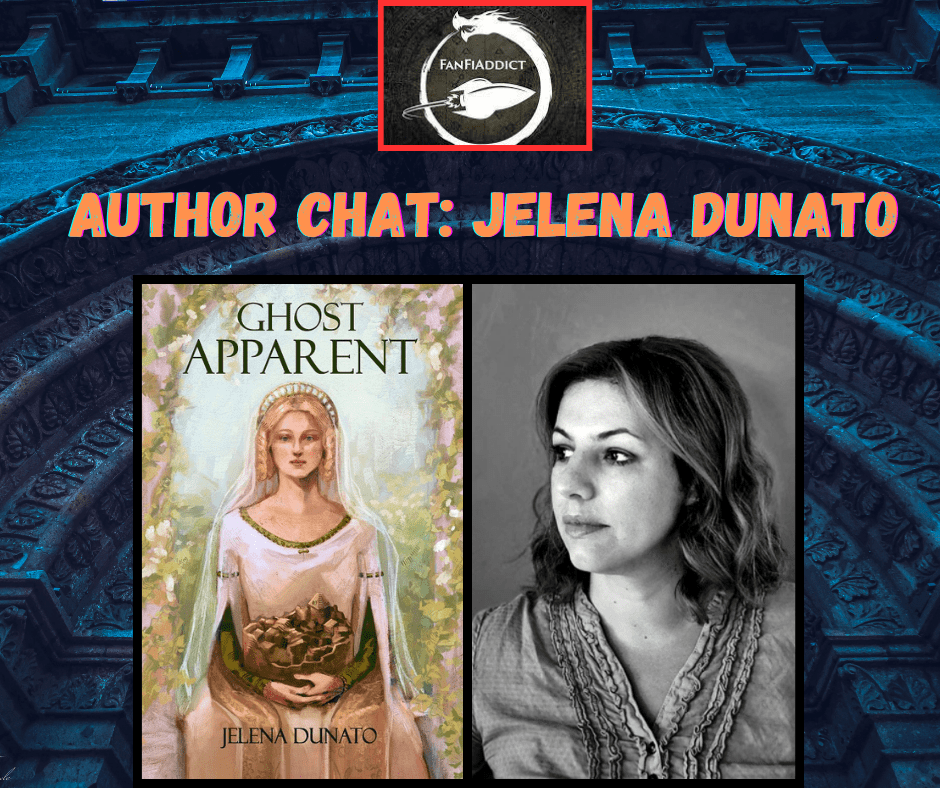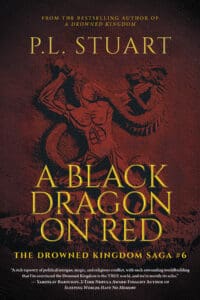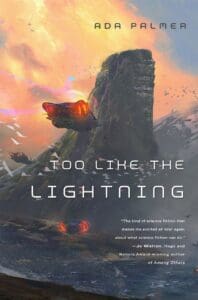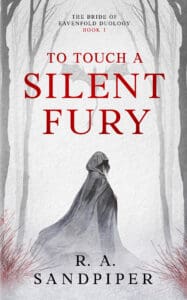
Jelena Dunato is an art historian, curator, speculative fiction writer and lover of all things ancient. She grew up in Croatia on a steady diet of adventure novels and then wandered the world for a decade, building a career in the arts.
Jelena’s stories have been published in Beneath Ceaseless Skies, The Dark, Future SF and Mermaids Monthly, among others. She is a member of SFWA and Codex. Her novel, Dark Woods, Deep Water, was published in September 2023. Her new novella, Ghost Apparent, comes out September 24, 2024.
Jelena lives on an island in the Adriatic with her husband, daughter and cat.
Hi Jelena, thanks for chatting. Your dark fantasy, Slavic-inspired novella Ghost Apparent comes out on 24 September from Ghost Orchid Press, and features the best fantasy protagonist of the year. I made that opinion of mine sound like objective truth, which is a villainous trick I use sparingly but I stand by it. Can you tell us what it’s about, and what kind of readers it will appeal to?
Hi Ed!
Ghost Apparent is a slightly unhinged slice of dark scheming, a political bloodbath filled with Croatian folklore and a taste of medieval Mediterranean politics. It’s a story about a girl – clever, but naive and sheltered – who gets betrayed and disappeared, and has nothing in her corner but her wits and some infuriatingly unhelpful gods as she fights to win back what is rightfully hers. It’s also a story that questions the purpose of government, the sources of power – a bit like Machiavelli, but more fun.
Like all my stuff, it’s also a dark fairy tale, feminist and angry, with a tongue-in-cheek romance and some pretty strong views on the importance of art and the liberty to read whatever one feels like reading.
Now, if you don’t care about big ideas and complex themes, let me just say that it’s also a fast-paced adventure with murder, torture and some lethal poetry thrown in.
It will appeal to people who like it quick and dirty, I guess.
This novel is a prequel to the addictively dark, chilling and utterly compelling dark fantasy Dark Woods, Deep Water which came out last year (though it also works completely as a standalone for new readers). What made you want to revisit this world?
I never left the world. It grows in my head like fungi in a warm, moist cavern.
I’m one of those pathetic nerds who’ve been building worlds in their heads since they were fourteen and invented sparkling, mysterious, ancient characters because no one wanted to talk to them in real life. Now that I’ve finally tricked you into reading about it, you’ll have to pry it from my cold dead hands.
But seriously, when I finished DWDW, I knew there was still so much story left to tell. Orsiana was the most obvious choice: a smart, independent woman in a precarious political marriage to a charming bully, someone deliberately hiding the extent of their power, someone seeing clearer and further than anyone around them. I didn’t necessarily start with the idea to write a prequel, or a novella, I simply wanted to explore Orsiana’s background. She was a character with an intriguing history which wasn’t directly crucial for DWDW, but I felt it was important in the greater scheme of things (this is a hint, yeah).
There’s an addictive mix in this story of court politics and more fantastical tropes, like the meddling role of the gods, that makes this an intriguing combination of Machiavellian manoeuvrings and Slavic-inspired folklore. Talk me through that mix – what inspired the politics, and what inspired the fantasy?
Politics inspired the politics, of course. I’ve been indirectly involved in contemporary politics for almost two decades, and I have a massive amount of knowledge – crammed into my head against my will – about local government, elections, corruption, power struggle and so on. The dirty underbelly of democracy. I’m also a senior curator in a museum, so I am aware of the political history, municipal regulations and codes, the legacy of the four hundred years of Venetian government on the Eastern Adriatic coast, and many everyday details that shaped the life of a typical medieval commune. I don’t use everything I know – I don’t want to write a political thriller or a historical novel – but some tasty morsels make the worldbuilding more plausible.
As for the folklore, Croatian pantheon has no written canon – we were Christianised before we learnt to write, so everything we know about our gods comes from the oral tradition and fairy tales. That makes my job easier, because it gives me a lot of freedom in shaping the gods. I’m not religious at all, but I’m drawn to the polytheistic idea of flawed, peevish, vindictive, lustful gods who are just as bad as humans, but infinitely more powerful. Those characteristics play beautifully into the typical fairy tale warning that we must be careful what we wish for and result in some spectacular mess for my characters.
One of the things that makes Orsiana such an incredible and incredibly refreshing character (have you noticed I like her yet) is her intelligent and at times bleak self-awareness of the world around her and her role in it. True love, politics, the gods, how a city works – she sees the cynicism behind it all, and even though her journey is heroic in some of the classic senses, it is also underwritten by this clear-eyed, almost fatalistic sense she has of how life inevitably plays out and the prices she has to pay to protect her city. What made you make her such a perceptive character, and how important was this underlying aspect of cynicism to the story? Wow I made this question a mouthful, but once again I stand by my villainy.
Short answer? Life’s too short for dumb characters.
I’ve never had much patience for characters who make mistakes because they are too stupid to know better. My favourite characters are always the perceptive, intelligent ones (DWDW readers will remember a certain old soldier who saw the true shape of things), and my favourite trope is the character who sees the trouble brewing but cannot stop it either because all choices are bad, or because those in power are too blind to see it. For me, the true darkness and horror, the genuine tragedy comes from that kind of awareness.
Orsiana at the beginning of “Ghost Apparent” is outside that archetype because she has to experience the loss, the shock and the grief to open her eyes. But once that veil of innocence is stripped away from her, I wanted her to see the truth. That clarity of vision is the whole purpose of the ordeal she went through. Of course, she had a good base in the education her father had given her, but without the coup, everything she’d learnt would’ve remained purely theoretical. She needed a transformative experience to become someone wise and cunning, but also someone capable of empathy and kindness.
I wouldn’t necessarily call Orsiana cynical. I think it’s pragmatism that grows from experience. A person who wants to rule other people should be aware that some concepts like “justice” or “faith” or even “true love” are constructs that simplify complex, ambiguous, difficult truths. Orsiana learns to see those truths in order to survive.
You’ve written before about the often problematic use of the term Slavic fantasy and how Slavic tropes and folklore are actually portrayed in books. First, what do we mean by Slavic-inspired fantasy, and second, to what extent do you feel the pressure to be authentic in your own novels? Especially given you are Croatian, which of course has its own particular myths as part of the Slavic pantheon.
The problem of the “Slavic fantasy” label is huge, and I’ve written so much about it that I don’t really want to repeat myself. Let’s just say that there are dozens of Slavic nations and languages, millions of people, vast territories, enormous histories and folklores. Cramming them all into one bucket is just like saying all Asians are the same.
On the other hand, I think that Slavic-inspired is not a bad term – because I am a Slavic person and I use elements of Slavic folklore (some of which are shared with other Slavic cultures) – but with the caveat that my story is also heavily influenced by the history of the Eastern Adriatic, which is a tapestry of various cultures – Ancient Greek and Roman, Illyrian, Byzantine, Venetian, Austro-Hungarian and, of course, Croatian.
I feel the pressure to be authentic not because of my English-speaking readers, who won’t be able to see the nuances, but because of my Croatian readers. I want them to recognize a fragment of their own heritage in my story, a shared experience, a common denominator. But most of all, I want to remain true to myself and my story. I hate to bring AI into this conversation, but I think it’s important to point out one of the crucial things AI grifters don’t understand: artists are filters. Everything I put in my story has grown from my experience and imagination, and it has been filtered through my artistic process and shaped by my skill. My story is authentic because it comprises so much of what makes me an artist and a human being. A girl who grew up in Croatia in the 90s, who’s lived in many different places, who loves art and history and reads all the time and has a million other quirks that make her unique.
(You can read an article by Jelena on the label of Slavic fantasy here)
If you had to pick a god/goddess from your own novella to help you, which would it be and why?
They are all so awful, aren’t they?
But if I really must choose one, I think it would be Lada, the Goddess of Love. I know it’s dangerous – not to mention embarrassing – to be magicked into falling in love with someone, but at least it might be fun.
You’ve now had two books out with indie dark fantasy and horror press Ghost Orchid – talk me through what’s made you return to them [for transparency purposes I should say that the interviewer is part of the Ghost Orchid team; yours, the Transparency Editor who inhabits Ed’s head]
They are a really solid small publisher – they communicate well, they pay on time, they’re honest and they have the best editors. I’ve never worked with a really big publisher, so I can’t compare, but I’m really happy with the great communication, the speed, the sense of community, the ability to easily negotiate things.
I’m really happy that we published these two books together and also produced a beautiful hardback set with some additional art and swag. It makes me feel appreciated as an author.
How have you found the general life of being an indie author? What’s the most challenging part – and how do you think the publishing industry can change to make it easier?
It’s very hard when you’re an obsessive, hair-splitting control freak like myself. I want to control every part of the process and I feel responsible for every misstep and failure. It drives me mad. Of course, I know there is no control in publishing, especially when you don’t have the budget to really move things, but I love blaming myself for not being viral enough, successful enough.
The absolute worst part is the doors slammed in your face. No matter how good your book is, no matter how hard you and your publisher try, you will inevitably come across a lot of gatekeeping from the industry. There will be bookshops who won’t take your book, magazines who won’t review it, professional networks who will refuse to announce the deal or any news about you, awards you will never be nominated for. So many outlets that could increase your visibility will ignore you.
I had a glimpse of the other side when Spotify released the Dark Woods, Deep Water audiobook. I only got the basic promotion from them, but even such a small push from someone so huge opened the doors that I couldn’t dream of opening myself. It’s so infuriatingly, frustratingly unfair.
The industry could change that by admitting that the indies are their partners and that readers want more books, different books, but that seems like wishful thinking to me.
Your covers for both Dark Woods, Deep Water and Ghost Apparent have been remarkable. How much input do you have in your covers, and what it is like working with artists for small presses?
It’s beautiful, it’s the best, it’s something that makes my art historian’s heart so happy and proud.
Antonia, the Ghost Orchid’s EiC, has understood from the beginning that art is something I’m really passionate about and she has given me a lot of freedom in shaping the covers. We decided on the artists and the general composition together. I had the final say on the design of the covers and the additional art we commissioned. The artists were all excellent: Liiga Klavina and Mia Minnis, who did the cover art, and Dory Whynot, who did the additional illustrations. I am a very visual person and I believe art makes books so much better – if it were up to me, all books would be illustrated.
I wish it was up to you, in that case.
Your website bio says that you’re an art historian, and that you wandered the world for a decade, building a career in the arts. With phrasing like that, you must have known there was no way I wouldn’t ask you to tell us a little more, especially how this has inspired your writing. But also very much the “wandering the world” bit.
I’ve always been restless and liked moving around, learning new things. I moved from Croatia to Slovenia, then to the UK, then moved back to Croatia but travelled extensively, working on some projects. My twenties were a period of constant change, and I liked it that way. When I chose to have a family, I had to slow down a little, but what I couldn’t explore in person, I explored in my mind. I suppose that without the isolation of my current island life, I’d never find the time to write down all the stories in my head. A bit of introspection came in handy and allowed me to develop my skills as a writer. But fortunately, kids grow and I’m picking up speed again.
I like travelling and seeing different cultures for the same reason I like art – because of the people behind it. When I see a painting, or a church, or an ancient village, I always wonder who made it, built it, used it, and what their lives were like. I like to imagine people in different settings, I like to speculate about their desires, fears, dreams. I think that all my stories come from that source.
What’s next for you as an author? Are you revisiting the increasingly expanding fantasy universe of the Amrian Kingdom or sailing to fresh fantasy pastures?
I have several irons in the fire, but my most important project is the next book set in the same world. By this point, I think it’s pretty obvious that I’m building a series one book at a time. Since I’m an indie author, and an ESL author, and a total outsider, I never dared to write (and try to sell) a trilogy. Also, I think that writing connected standalones is way more fun and allows you the freedom to explore different character arcs without being limited by the big series arc.
This book is a standalone, again. It picks up where DWDW left off, but then it goes back in time because I love to make my life complicated with multiple timelines. At the end of DWDW, the destiny of one of the main characters was resolved in a way that deliberately left some room for speculation: the new book is essentially his story. Again, it has elements of dark fantasy, Slavic folklore and twisted fairy tale in it, but this time, I put love at its core. I’m sure that many readers who read DWDW and Ghost Apparent believe I’m cynical about love, but that’s not true – I just write a very harsh world where love is rare and fragile. So, after exploring divine curses and political machinations in my previous books, in my new book I tried to answer a deceptively simple question: “If we met in another life, would you still love me?”
Well I’m on board…
Thanks for chatting Jelena!
Ghost Apparent can be ordered direct from Ghost Orchid Press in paperback here and e-book here.
Also available on Amazon here.




Leave a Reply